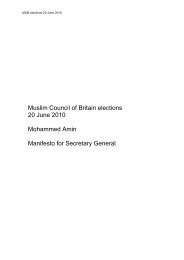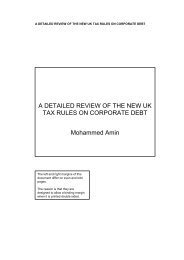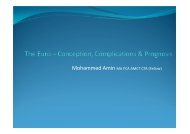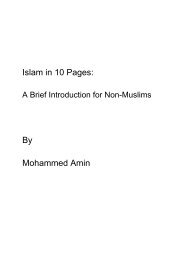Presentation - Mohammed Amin's website
Presentation - Mohammed Amin's website
Presentation - Mohammed Amin's website
Create successful ePaper yourself
Turn your PDF publications into a flip-book with our unique Google optimized e-Paper software.
Institute of Islamic Banking and Insurance<br />
<strong>Mohammed</strong> Amin<br />
12 February 2013
<strong>Presentation</strong> outline<br />
• Disclaimer<br />
• Speaker’s details<br />
• Purpose, scope and methodology of the study<br />
• Current status<br />
• Key findings and recommendations<br />
• Next steps<br />
Slide 2
Disclaimer<br />
• Taxation is a complex subject and almost all issues<br />
require specific professional advice.<br />
• Nothing in this presentation is intended to constitute<br />
professional advice.<br />
• The speaker accepts no responsibility to anyone<br />
who may act, or refrain from acting, as a result of<br />
anything shown or said during this presentation.<br />
Slide 3
Slide 4
<strong>Mohammed</strong> Amin<br />
<strong>Mohammed</strong> Amin is an Islamic finance consultant. Previously he<br />
was a partner in PricewaterhouseCoopers LLP and led their<br />
Islamic finance practice in the UK.<br />
He is:<br />
• a chartered accountant, a chartered tax adviser and a<br />
qualified corporate treasurer<br />
• a Council member of the Chartered Institute of Taxation<br />
• a member of Editorial Advisory Board of New Horizon, the<br />
magazine of the Institute of Islamic Banking and Insurance<br />
Amin has spoken on Islamic finance in over 20 cities covering<br />
every continent except Antarctica. Many of his articles and<br />
presentations on Islamic finance can be found on his <strong>website</strong>:<br />
www.mohammedamin.com<br />
Slide 5
Slide 6
Purpose<br />
• Ascertain the tax treatment of common Islamic<br />
finance structures in MENA countries.<br />
• Focus on cross border transactions.<br />
• Identify tax obstacles to Islamic finance.<br />
• Provide policy recommendations.<br />
Slide 7
Study team<br />
• Qatar Financial Centre Authority - sponsor<br />
• International Tax and Investment Center<br />
• Ernst & Young – Questionnaire management<br />
• PwC Malaysia – Malaysian questionnaire<br />
• Researchers:<br />
• <strong>Mohammed</strong> Amin – lead writer<br />
• Salah Gueydi – Qatar Tax Authority<br />
• Hafiz Choudhury - ITIC<br />
Slide 8
Sponsor: Qatar Financial Centre Authority<br />
• Strategically located as an important platform for conducting business in the rapidly<br />
growing Middle East and North Africa region, the Qatar Financial Centre (QFC) has<br />
firmly established itself as a thriving location for global and regional financial services<br />
firm looking to capitalise on the opportunities offered by the region.<br />
• The QFC Authority is the commercial and strategic arm of the QFC. The QFC<br />
Authority also serves as a ‘think-tank’ for the State of Qatar on financial services, in<br />
addition to acting as an interface between participants who would like to use the QFC<br />
as a platform to expand within the region and the State of Qatar. The QFC has a<br />
specific set of regulations covering the taxation of Islamic Finance transactions, and a<br />
QFC entity has already been used in the structuring of a Sukuk funding a property<br />
development in Qatar.<br />
• The QFC is delighted to be able to support further research into the developing<br />
subject of the taxation of Islamic Finance transactions by the thought leaders in this<br />
area.<br />
Slide 9
Scope - MENA Region<br />
Study information received<br />
Egypt<br />
Jordan<br />
Kuwait<br />
Libya<br />
Oman<br />
Qatar – main territory<br />
Qatar – special rules in QFC<br />
Saudi Arabia<br />
Turkey<br />
No information for this phase<br />
Algeria<br />
Bahrain<br />
Iran<br />
Iraq<br />
Lebanon<br />
Morocco<br />
Palestinian Territories<br />
Syria<br />
Tunisia<br />
United Arab Emirates<br />
Yemen<br />
Slide 10
Taxes covered<br />
• Taxes on income payable by companies, individuals and<br />
trusts (where applicable.)<br />
• Taxes on capital gains<br />
• Taxes on the transfer of assets, such as real estate<br />
transfer tax, where such taxes are not recoverable by the<br />
purchaser<br />
VAT excluded from this initial study<br />
Slide 11
Slide 12
Structures analysed<br />
• Four structures chosen for study.<br />
1. Commodity murabaha / tawarruq – economically<br />
equivalent to a conventional loan.<br />
2. Ijarah sukuk (onshore and offshore SPV) –<br />
economically equivalent to issuing a tradable bond.<br />
3. Salaam – economically equivalent to financing by<br />
committed forward purchase of goods.<br />
4. Istisna – economically equivalent to construction<br />
finance.<br />
• Detailed transaction descriptions<br />
Slide 13
Commodity murabaha or tawarruq<br />
Bank<br />
Immediate sale with<br />
deferred payment<br />
Customer<br />
Overseas<br />
100 paid<br />
today<br />
105 paid in 12<br />
months time<br />
Sale for<br />
Frontier<br />
Murabaha contract<br />
immediate<br />
payment<br />
Your country<br />
Sale for<br />
immediate<br />
payment<br />
100 paid<br />
today<br />
Commodity seller<br />
Commodity buyer<br />
Slide 14
Ijarah sukuk with onshore SPV<br />
Charity<br />
Issue sukuk<br />
Frontier<br />
Pay issue price 100<br />
Special Purpose<br />
Vehicle (SPV)<br />
Periodical payments<br />
representing SPV’s profits 5<br />
Investors<br />
Lease<br />
Sell<br />
building<br />
Owner<br />
Pay<br />
price<br />
100<br />
Pay rent<br />
periodically 5<br />
Note: Unwind<br />
transactions at end<br />
of sukuk not<br />
shown.<br />
Slide 15<br />
Your<br />
country<br />
Overseas
Transaction description for sukuk with onshore SPV<br />
1. Owner is a company located in your country.<br />
2. Today Charity which is not connected with Owner creates a company called Special Purpose Vehicle (SPV)<br />
located in your country.<br />
3. Owner owns a building which it purchased many years ago for $20 million. Today, after SPV has been formed,<br />
Owner sells that building to SPV for a price of $100 million payable in 30 days’ time.<br />
4. Today Owner gives SPV a purchase undertaking by promising that if in five years’ time SPV offers to sell the<br />
building to Owner for a price of $110 million, Owner will buy.<br />
5. Today SPV gives Owner a sale undertaking by promising that if in five years’ time Owner offers to buy the<br />
building from SPV for a price of $110 million, SPV will sell.<br />
6. Today SPV rents the building to Owner with a lease which is five years long. The rent is $5 million per year,<br />
payable once a year with the first payment in 12 months’ time.<br />
7. SPV creates sukuk certificates under which it holds the building, the lease and the benefit of the Owner’s<br />
purchase undertaking as trustee for whoever is the owner of the sukuk certificates.<br />
8. Between today and day 30 the sukuk certificates are sold to investors for a total price of $100 million. All of the<br />
investors are located overseas.<br />
9. On day 30, SPV pays the $100 million to Owner which is owed for the purchase of the building.<br />
10. In 12 months’ time, Owner pays rent of $5 million to SPV. SPV immediately passes that rent on to the investors<br />
in proportion to their ownership of the sukuk certificates. The same happens at the end of years 2, 3, 4 and 5.<br />
11. Also at the end of year 5, Owner offers to buy the building from SPV for a price of $110 million. SPV agrees to<br />
sell, as it has promised to do under the terms of its sale undertaking. Owner pays $110 million to SPV and SPV<br />
transfers ownership of the building to Owner.<br />
12. SPV passes the $110 million sale price of the building on to the investors in proportion to their ownership of the<br />
sukuk certificates.<br />
13. The sukuk certificates are cancelled as they have no further value as SPV has no remaining assets.<br />
14. After completion of the above transactions, as SPV should have no assets and no liabilities, SPV will be<br />
liquidated.<br />
Slide 16
Ijarah sukuk with offshore SPV<br />
Charity<br />
Issue sukuk<br />
Overseas<br />
Frontier<br />
Special Purpose<br />
Vehicle (SPV)<br />
Pay issue price 100<br />
Periodical payments<br />
representing SPV’s profits 5<br />
Investors<br />
Your<br />
country<br />
Lease<br />
Sell<br />
building<br />
Owner<br />
Pay<br />
price<br />
100<br />
Pay rent<br />
periodically 5<br />
Note: Unwind<br />
transactions at end<br />
of sukuk not<br />
shown.<br />
Slide 17
Salaam<br />
Overseas<br />
Frontier<br />
Bank<br />
Promise to purchase the<br />
goods when they become<br />
available - wad<br />
Your country<br />
Goods produced<br />
and delivered in<br />
12 months time<br />
100<br />
paid<br />
today<br />
Supplier of goods capable<br />
of being fully specified<br />
e.g. farmer<br />
Salam contract<br />
Goods sold and<br />
delivered in 12<br />
months time<br />
105 paid in 12<br />
months time<br />
Customer seeking<br />
goods in future for<br />
own use or trade,<br />
requiring finance<br />
Slide 18
Istisna<br />
Bank<br />
Overseas<br />
Building or ship sold when<br />
finished, assume 12<br />
months<br />
105 paid in 12 months time<br />
Frontier<br />
Your country<br />
Customer wanting<br />
building, ship<br />
or similar<br />
Building or<br />
ship,<br />
ownership<br />
passes when<br />
finished<br />
100 paid<br />
in stage<br />
payments<br />
Istisna contract<br />
Second istisna contract<br />
Note: Here the istisna<br />
contracts run for only 12<br />
months. In practice likely to<br />
be for longer. Price paid<br />
under second contract set to<br />
give appropriate profit rate to<br />
bank.<br />
Construction company,<br />
shipbuilder or similar<br />
Slide 19<br />
Note: As an alternative to<br />
the second istisna contract,<br />
there could be a wad given<br />
by the Customer, promising<br />
to purchase the building<br />
when finished.
Specific questions<br />
• 68 questions about law and tax treatment in the host<br />
country, including tax treaty implications.<br />
Slide 20
Slide 21
Commodity murabaha<br />
• Tax deductibility of Customer’s expense<br />
• Does transaction create a taxable presence for<br />
Bank?<br />
• Withholding tax<br />
• Impact of tax treaties<br />
• Transfer taxes<br />
Slide 22
Ijarah sukuk<br />
• Taxation of transfer of building to SPV<br />
• Deductibility of rental expense<br />
• Income tax position of SPV<br />
• Withholding tax on payments to investors<br />
• Taxation of sale of sukuk certificates<br />
• Taxation of SPV on closing sale of building<br />
• Impact of tax treaties<br />
• Transfer taxes<br />
Slide 23
Salaam<br />
• Does transaction create a taxable presence for<br />
Bank?<br />
• Withholding tax<br />
• Impact of tax treaties<br />
• Transfer taxes<br />
Slide 24
Istisna<br />
• Does transaction create a taxable presence for<br />
Bank?<br />
• Withholding tax<br />
• Impact of tax treaties<br />
• Transfer taxes<br />
Slide 25
Slide 26
Current status of study<br />
• Questionnaires distributed to jurisdictions;<br />
• Responses for eight countries received and analysed;<br />
• Response also obtained from Malaysia, and implicitly from UK<br />
(as author is a UK tax specialist) to provide non-MENA<br />
comparisons.<br />
• Report finished and being printed.<br />
Slide 27
Slide 28
Legislation for Islamic finance<br />
• Turkey has rules for onshore sukuk.<br />
• So does the Qatar Financial Centre.<br />
• Otherwise no MENA country responding has any<br />
special tax law for Islamic finance.<br />
Slide 29
Murabaha, salaam and istisna<br />
• Some commercial restrictions on involvement by<br />
foreign banks. For example Libya prohibits foreign<br />
persons buying and selling commodities within<br />
Libya.<br />
• Overall, all jurisdictions appear to give a tax<br />
deduction to the party receiving finance.<br />
• Lack of certainty on whether these are treated as<br />
financing transactions and on timing of deductions.<br />
Slide 30
Sukuk<br />
• Only Turkey and QFC have specific rules for sukuk.<br />
• Kuwait does not tax gains by companies where all<br />
the shareholders are GCC individuals.<br />
• Otherwise, significant tax charges on our<br />
hypothetical transactions, making the use of sukuk<br />
prohibitively expensive.<br />
• Sukuk transactions have been done (eg in Saudi<br />
Arabia) so facts may have differed or special<br />
exemptions been given.<br />
Slide 31
Malaysian and UK legislative approaches<br />
• Both have legislated for Islamic finance.<br />
• Both have equalised taxation of Islamic finance and<br />
conventional finance.<br />
• Malaysia<br />
• Muslim majority country.<br />
• Explicit recognition of Islam.<br />
• Central pre-approval of Islamic finance transactions.<br />
• UK<br />
• No recognition of Islam.<br />
• Legislation religiously neutral.<br />
Slide 32
Overall Malaysian approach<br />
• Financing structures based on Shariah principles are<br />
accorded tax neutrality, subject to first obtaining<br />
approvals from regulatory bodies, such as the Bank<br />
Negara Malaysia, Securities Commission or Labuan<br />
Offshore Financial Services Authority.<br />
• Regulatory approval first<br />
treatment.<br />
neutral tax<br />
Slide 33
Malaysia - key tax statutes<br />
Income Tax Act, 1967 – Paragraph 2(7) & 2(8)<br />
“2(7) Any reference in this Act to interest shall apply, mutatis mutandis, to gains or profits<br />
received and expenses incurred, in lieu of interest, in transactions conducted in<br />
accordance with the principles of Syariah.<br />
2(8) Subject to subsection (7), any reference in this Act to the disposal of an asset or a<br />
lease shall exclude any disposal of an asset or lease by or to a person pursuant to a<br />
scheme of financing approved by the Central Bank, the Securities Commission, the<br />
Labuan Financial Services Authority or the Malaysia Co-operative Societies Commission<br />
as a scheme which is in accordance with the principles of Syariah where such disposal is<br />
strictly required for the purpose of complying with those principles but which will not be<br />
required in any other schemes of financing.”<br />
Stamp Act, 1949 – Schedule II, Para (6)<br />
“An instrument executed pursuant to a scheme of financing approved by the Central<br />
Bank, the Labuan Financial Services Authority, the Malaysia Co-operative Societies<br />
Commission or the Securities Commission as a scheme which is in accordance with the<br />
principles of Syariah, where such instrument is an additional instrument strictly required<br />
for the purpose of compliance with those principles but which will not be required for any<br />
other schemes of financing”<br />
Slide 34
Overall UK approach<br />
• UK examined transactions Islamic finance uses.<br />
• Mirrored those transactions in UK tax law<br />
• No reference to Shariah<br />
• No reference to Arabic terminology<br />
Tax law<br />
Purchase and resale<br />
Deposit<br />
Profit share agency<br />
Diminishing shared ownership<br />
Investment bond<br />
Islamic finance<br />
Murabaha<br />
Mudarabah<br />
Wakala<br />
Diminishing musharaka<br />
Sukuk<br />
Slide 35
UK legislation example (1)<br />
Corporation Tax Act 2009 section 503 Purchase and resale arrangements<br />
(1) This section applies to arrangements if—<br />
(a) they are entered into between two persons (“the first purchaser” and “the<br />
second purchaser”), one or both of whom are financial institutions, and<br />
(b) under the arrangements—<br />
(i) the first purchaser purchases an asset and sells it to the second purchaser,<br />
(ii) the sale occurs immediately after the purchase or in the circumstances<br />
mentioned in subsection (2),<br />
(iii) all or part of the second purchase price is not required to be paid until a<br />
date later than that of the sale,<br />
(iv) the second purchase price exceeds the first purchase price, and<br />
(v) the excess equates, in substance, to the return on an investment of money<br />
at interest.<br />
Slide 36
UK legislation example (2)<br />
(2) The circumstances are that—<br />
(a) the first purchaser is a financial institution, and<br />
(b) the asset referred to in subsection (1)(b)(i) was purchased<br />
by the first purchaser for the purpose of entering into<br />
arrangements within this section.<br />
(3) In this section—<br />
“the first purchase price” means the amount paid by the first<br />
purchaser in respect of the purchase, and<br />
“the second purchase price” means the amount payable by<br />
the second purchaser in respect of the sale.<br />
(4) This section is subject to section 508 (provision not at<br />
arm’s length: exclusion of arrangements from this section and<br />
sections 504 to 507).<br />
Slide 37
Commodity murabaha<br />
• Malaysia and UK both:<br />
• Treat it as a financing transaction = loan<br />
• Markup taxed in the same way as interest<br />
• Markup subject to standard withholding tax rules when<br />
paid cross border<br />
• No taxable presence for foreign bank created<br />
• Different approaches to legal drafting.<br />
• Same tax treatment, equivalent to conventional<br />
finance, achieved.<br />
Slide 38
Sukuk with onshore SPV<br />
• Malaysia and UK both:<br />
• Disregard transfer of assets to/from SPV for tax<br />
purposes.<br />
• Tax sukuk investors as if they were receiving interest.<br />
Slide 39
Recommendations<br />
• Malaysian model more suitable for MENA countries<br />
• No problems with explicit recognition of Islam.<br />
• Central certification of Islamic finance transactions<br />
allows simplified tax law drafting.<br />
• Much quicker and simpler than UK approach.<br />
Slide 40
Slide 41
Next steps<br />
• Complete geographical coverage<br />
• Cover additional structures<br />
• Cover additional taxes and levies<br />
• Consumption taxes<br />
• Zakat<br />
• Double taxation treaties<br />
• Consider regulatory and governance issues<br />
• Prudential regulation<br />
• Shariah governance<br />
Slide 42







